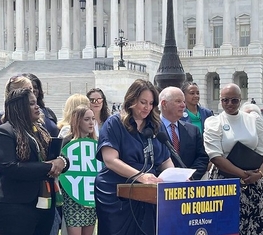Richardson v. Texas Secretary of State
Case Summary
Several voters, the League of Women Voters of Texas, MOVE Texas Civic Fund, the Austin Justice Coalition, and the Coalition of Texans with Disabilities filed a lawsuit challenging the state’s signature verification process for mail-in ballots. The plaintiffs argue the current process violates the Fourteenth Amendment, the Americans with Disabilities Act, and the Rehabilitation Act of 1973.
Currently, Texas law allows the following groups to vote early by mail: voters who are outside of their counties during elections, voters with disabilities, voters who are 65 years or older, and certain eligible voters incarcerated in jail. Mail ballots may be rejected by election officials if, in their judgment, the signature on the return envelope does not match the one they have on record. Voters are not notified if their ballot was rejected for an allegedly mismatched signature, and there is no process to cure it before the election.
On August 7, 2019, the League of Women Voters of Texas, along with several co-plaintiffs filed a federal lawsuit alleging this system, which provides no uniform standards to evaluate signatures, or a notice and cure process for voters to verify or fix a mismatched signature, violated the Equal Protection and Due Process Clauses of the Fourteenth Amendment to the US Constitution.
The plaintiffs further argued that the lack of a notice and cure process for voters to prevent their ballots from being rejected for signature mismatch constituted a denial of reasonable accommodations for voters with disabilities, in violation of the Rehabilitation Act of 1973 and the Americans for Disabilities Act.
On September 8, 2020, the district court granted the plaintiffs’ request for a preliminary injunction and ordered the Secretary of State of Texas to take several measures before the November 3, 2020 election. Specifically, the court ordered that the Secretary of State advise local election officials that rejecting a mail ballot for signature mismatch was unconstitutional unless voters were notified of this error before rejection and provided an opportunity to remedy it. Furthermore, for the upcoming November election, the order required the Secretary of State to forbid any local election official to reject a ballot for signature mismatch or enact the notice and cure procedure detailed by the court.
In response, the defendants appealed to the Fifth Circuit Court of Appeals which granted a stay of the district court’s opinion. On March 16, 2022, the circuit court overturned the district court’s preliminary injunction, holding that the Texas Secretary of State had sovereign immunity in the case.
The plaintiffs then petitioned the United States Supreme Court for a writ of certiorari on August 19, 2022.
The League is represented by the Texas Civil Rights Project and Willkie Farr and Gallagher LLP.
LWV Timeline
Plaintiffs File Their Lawsuit
The League of Women Voters of Texas, along with MOVE Texas Civic Fund, the Austin Justice Coalition, and Coalition of Texans with Disabilities sue in federal court, alleging Texas’ signature verification process for absentee ballots discriminated against voters with disabilities in violation of the Fourteenth Amendment, the Rehabilitation Act, and the American with Disabilities Act.
District Court denies defendants’ Motion to Dismiss
The court denies the defendants’ motion to dismiss, finding that the plaintiffs sufficiently pled violations of the 14th Amendment’s Equal Protection and Due Process Clauses, the Rehabilitation Act, and the Americans with Disabilities Act.
District Court grants injunction
The district court grants the plaintiffs’ request for a preliminary injunction and orders the Secretary of State of Texas to take several measures before the November 3, 2020 election, including either not rejecting ballots because of signature mismatch or creating a notice and cure process for voters.
Fifth Circuit stays the District Court injunction
The court stays the district court’s injunction, ruling the plaintiffs had no liberty or property interest to bring a procedural due process claim, that Texas’ interest in preventing voter fraud justified its current signature mismatch process and outweighed the burden it imposed on voters, and that the Secretary of State would likely succeed in asserting sovereign immunity.
General election occurs
The Fifth Circuit reverses the District Court injunction
The Fifth Circuit reverses the district court’s grant of a preliminary injunction, ruling the Texas Secretary of State could not be sued because of sovereign immunity.
Plaintiffs file for a writ of certiorari
The plaintiffs appeal to the US Supreme Court.
Supreme Court denies petition for writ of certiorari
In an unsigned order, the Court denies the petition for a writ of certiorari.
Texas creates notice and cure process for mail ballots
Governor Greg Abbott signs SB 1599 into law. The bill creates a notice and cure process for mail ballots and applications to vote by mail.
Plaintiffs file stipulation of dismissal
After the passage of SB 1599, plaintiffs file a stipulation for dismissal without prejudice of their remaining claims.





